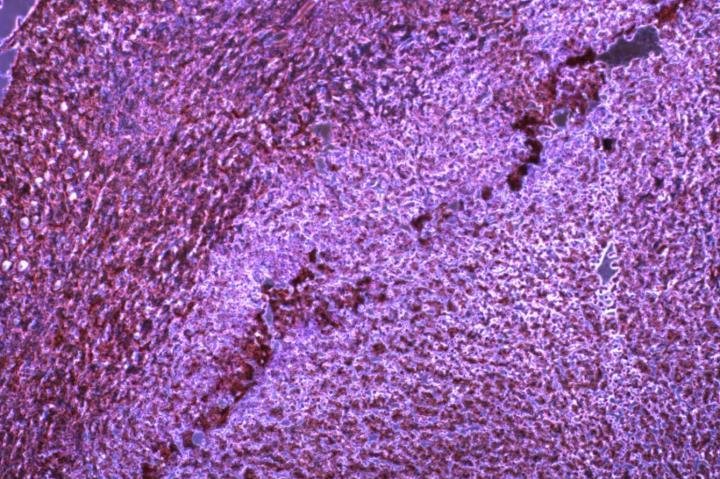Salk researchers have discovered how oxygen-deprived tumors survive the body's immune response. Here, visible regions of hypoxia in tumor samples correlate with cell signaling linked to suppressing the immune system. Photo courtesy the Salk Institute
Sept. 18 (UPI) -- Researchers at the Salk Institute have discovered how microRNA aids fast-growing cancerous tumors in evading anti-tumor immunity.
MicroRNAs are small, noncoding RNA molecules that regulate genes by silencing RNA and have been increasingly implicated in tumor survival.
The team found two gene-regulating molecules that alter cell signaling within tumor cells to survive and subvert the body's immune response.
The study, published today in Nature Cell Biology, could one day point to a new target for cancer treatment.
"The immunological pressure occurring during tumor progression might be harmful for the tumor to prosper," Professor Juan Carlos Izpisua Belmonte, of the Salk Institute, said in a press release. "However, the cancer cells find a way to evade such a condition by restraining the anti-tumor immune response."
Cancerous tumors are known to grow so rapidly that they use up their available blood supply, which creates a low-oxygen environment called hypoxia. Under hypoxia, cells start to self-destruct, but the microenvironment surrounding hypoxic tumor tissue sometimes helps to shield the tumor.
"Our findings actually indicate how cancer cells respond to a changing microenvironment and suppress anti-tumor immunity through intrinsic signaling," Izpisua Belmonte said.
Researchers screened different tumor types for altered levels of microRNAs and identified two microRNAs whose levels increase in hypoxic tumors, miR25 and miR93.
The levels of those two microRNAs were measured in the tumors of 148 cancer patients and researchers found that tumors with high levels of miR25 and miR93 led to worse prognosis when compared to tumors with lower levels.
The opposite was true for a molecule known as cGAS. The lower the level of cGAS in a tumor, the worse the outcome chances for the patient.
"Given these results, we wondered if these two microRNA molecules, miR25 and miR93, could be lowering cGAS levels to create a protective immunity shield for the tumor," said Min-Zu Wu, a research associate in Salk's Gene Expression Laboratory.
Using mouse models and tissue samples, researchers showed that a hypoxia state triggered miR25 and miR93 to set off a chain of cell signaling that lowered cGAS levels. Tumor growth can be slowed in mice by inhibiting miR25 and miR93.















